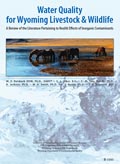 apply now
apply now University of Wyoming Extension
Department #3354
1000 E. University Ave.
Laramie, WY 82071
Phone: (307) 766-5124
Email: uwext@uwyo.edu




 | Water Quality for Wyoming Livestock & Wildlife | |
Publication #: B-1183 Publication Author(s): |
Description:
Water is the single most important nutrient for livestock and big game wildlife species. It is the most abundant ingredient of the animal body in all phases of growth and development. A calf's body contains 75 to 80% water at birth and about 55 to 65% water at maturity. While animals can survive for a week or more without food, death is likely in a matter of days without adequate water intake. Water is involved either directly or indirectly in virtually every physiologic process essential to life. Water is the medium in which all chemical reactions in the body take place. Blood, which contains 80% water, is vital in transporting oxygen to the tissues and carbon dioxide from the tissues as well as being the life support system for the body. It is the medium for transporting nutrients, metabolic wastes, and chemical messengers, such as hormones, throughout the body. It provides the chemical base for nutrient digestion and uptake from the GI tract and for the elimination of waste products via urine and bile. Water's physical properties make it an important factor in the transfer of heat and the regulation of temperature in the body. Due to its high specific heat (the ability to absorb or give off heat with a relatively small change in temperature), water is ideally suited as a temperature buffering system for the body. A restriction of water intake lowers feed intake and N retention (i.e. protein), and it increases N loss in the feces. It also results in increased excretion of urea in the urine. Animals may survive a loss of nearly all the fat and about one-half of bodily protein, but a loss of about one-tenth of water from the body results in death.
Printing Problems? If your pdf is printing with odd characters, save the file to your computer. Open the file with Adobe Reader. The file should now print correctly. If you are still having problems, please, contact us at Publications Support or call (307) 766-5157.
Need Further Assistance? Contact Publications Support or call (307) 766-5157.
University of Wyoming Extension
Department #3354
1000 E. University Ave.
Laramie, WY 82071
Phone: (307) 766-5124
Email: uwext@uwyo.edu



